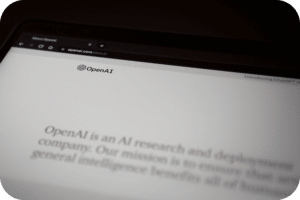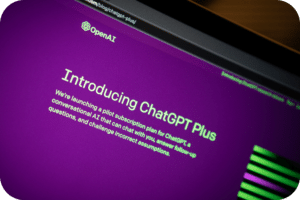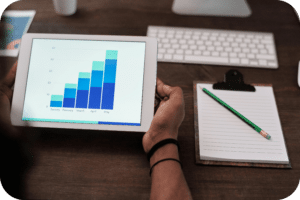AI Technology Integration into the Business Environment
Artificial intelligence (AI) has seamlessly integrated into our daily lives and is revolutionising the way we work and conduct business. The workplace, in particular, has experienced a significant transformation as a result of the rise of AI technology and businesses are racing to capture its value.
When AI technology first launched, McKinsey research predicted that generative AI would add up to $4.4 trillion to the global economy each year – and since then interest from businesses using AI in the workplace has continued to soar, as the breadth of its potential is realised. Fuelled by the rise of AI, ChatGPT gained 1 million users in five days and only two months later it had 100 million users making it one of the fastest growing platforms in history.

The advent of generative AI, in particular, is likely to have the biggest impact on ‘knowledge work’ (education, law, technology) and especially activities involving decision-making and collaboration. In this article, we dive into some of the ways that AI is transforming how businesses operate and how they can leverage the rise of AI technology.
AI in the Workplace: Enhancing Efficiency through Increased Automation
Every business has routine tasks to complete daily, which can be time-consuming and onerous. By using AI in the workplace, we free up the human workforce and have it take over these time-consuming tasks so we can prioritise more important tasks.
Whether the automation is using AI-powered chatbots to answer customer queries or AI-powered platforms to manage calendars, AI can take ownership of handling tedious business tasks across all areas from IT to data collection for marketing. As the rise of AI technology continues, it's important to note that AI is still in its developmental years. It will use AI algorithms to learn from its mistakes and automation processes will only continue to improve over time as the quality of the data available becomes richer.
Informed Decision-Making: Harnessing AI in the Workplace for Strategic Insights

Utilising AI in the workplace has the potential to transform business decision-making by removing the need for humans to manually sift through large amounts of data and reach conclusions on their own. Using ChatGPT Plus for instance to analyse big data quickly, identify trends and predict outcomes can be invaluable in getting the ball rolling and giving the user the insights they need to make informed decisions and align the information to overall goals and visions.
In many areas, the use of AI in the workplace has proven to be faster and more accurate than humans and it can save businesses money, time and resources.
AI in the Workplace: Bolstering Cybersecurity with Intelligent Solutions

Cybercrime is a constant threat to businesses, and it has become ‘must-have’ to implement a cybersecurity strategy that reduces the chance of sensitive data being viewed and misused. Although cybercriminals are becoming increasingly advanced and sophisticated, so is the tech designed to fight them. Fortunately, the rise of AI has set the scene for systems that can be trained to detect threats or unusual activity, identify new types of malware, and safeguard sensitive data, significantly reducing the likelihood of a successful cyberattack.
Before the rise of AI, traditional cybersecurity relied heavily on signature-based detection systems which were able to detect incoming traffic to a database of known threats and when a match was found, you would receive an alert and suspicious traffic would be blocked.
But now the technology can use machine learning algorithms to detect and respond to both known and unknown threats in real-time without the need for human intervention. These advancements can help workforces feel more confident that they are protecting their sensitive data and the cost-saving benefits of not hiring humans is a bonus.
Elevating Data Intelligence: How AI in the Workplace is Transforming Analytics

Thanks to the rise of AI in the workplace, organisations are able to delve deeply into data, unveiling crucial insights, real-time performance metrics, and predictive trends essential for strategic planning.
These tools facilitate thorough data analyses, real-time monitoring, predictive analytics, enhanced data visualization, and automated reporting, which not only improve decision-making but also enhance data quality and cost efficiency. Moreover, they can be customized to cater to the unique needs of different organisations, providing tailored insights that align with specific business goals.
Through the rise of AI technology, data analytics has become more intuitive, accurate, and timely, making it a crucial asset for modern organisations aiming for a data-driven culture. This technological leap fosters a competitive edge in the rapidly evolving digital marketplace, making AI an indispensable asset in the modern workplace, particularly in the realm of data analytics.
Harnessing AI for Smarter, More Effective Recruitment
Sourcing talented employees and retaining them can be a challenging process for many organisations, not to mention a significant drain on time. By taking the repetitive, time-sensitive tasks of the process such as interview scheduling, resume screening and pre-selection off your team’s hands and allowing AI to manage the initial stages of hiring, the focus can be put on more important tasks.
Two key benefits for recruitment agencies looking to take advantage of the rise of ai are reducing the time it takes to hire and avoiding talent waste.
Efficient hiring is always a difficult task to navigate. While you want to put the right candidate in the open position, you also have the pressure to fill the slot as quickly as possible in a cost-efficient way. By reducing the amount of time spent analysing resumes or screening applicants, AI can help hiring managers to move through the interview process faster – without sacrificing on the quality of candidates.
At times, the best person for the available role may not come straight through the door. Candidates who may have applied for other positions in the company or those who are actively looking for a new role on LinkedIn might be a better fit than direct applicants and this kind of data should be utilised for hiring purposes. AI-powered software can investigate existing databases, LinkedIn and applicant tracking systems, boosting the chances of finding the perfect candidate.
The rise of AI in the workplace has changed recruitment as we know it in profound ways. From automating routine tasks to enabling better decision-making and enhancing employee development, the integration of AI technologies is unlocking new levels of efficiency and productivity.
And, as AI continues to evolve, its impact on the workplace will undoubtedly grow, shaping the future of work in ways we are only beginning to comprehend. Businesses that embrace AI in the workplace and adapt to this technological shift will be better positioned to succeed in the fast-paced, data-driven landscape.
If you are interested in investing in your business with AI technology and are looking to hire talent that can support your journey, get in touch with one of our consultants today.

























